Report: APES 110 Code of Ethics for Professional Accountants
VerifiedAdded on 2022/12/29
|6
|1287
|92
Report
AI Summary
This report provides an in-depth analysis of the APES 110 Code of Ethics for Professional Accountants, a crucial framework developed by the Accounting Professional and Ethical Standards Board (APESB) in Australia. The report explores the introduction, main body, and conclusion of the topic, emphasizing the importance of ethical conduct in the accounting field. It examines the five fundamental principles of the code: integrity, objectivity, confidentiality, professional competence, and due care, along with the three parts of the code (A, B, and C) that apply to all members, members in public practices, and members in businesses, respectively. The report also discusses the conceptual framework, the importance of responding to Non-compliance with Laws and Regulations (NOCLAR), and the role of APES 110 in guiding professional accountants to act in the public interest. The analysis highlights the significance of adhering to ethical standards to ensure effective work and minimize errors, referencing key publications to support its findings. The report concludes by summarizing the importance of implementing and following the APES 110 Code of Ethics to maintain ethical standards within the accounting profession.
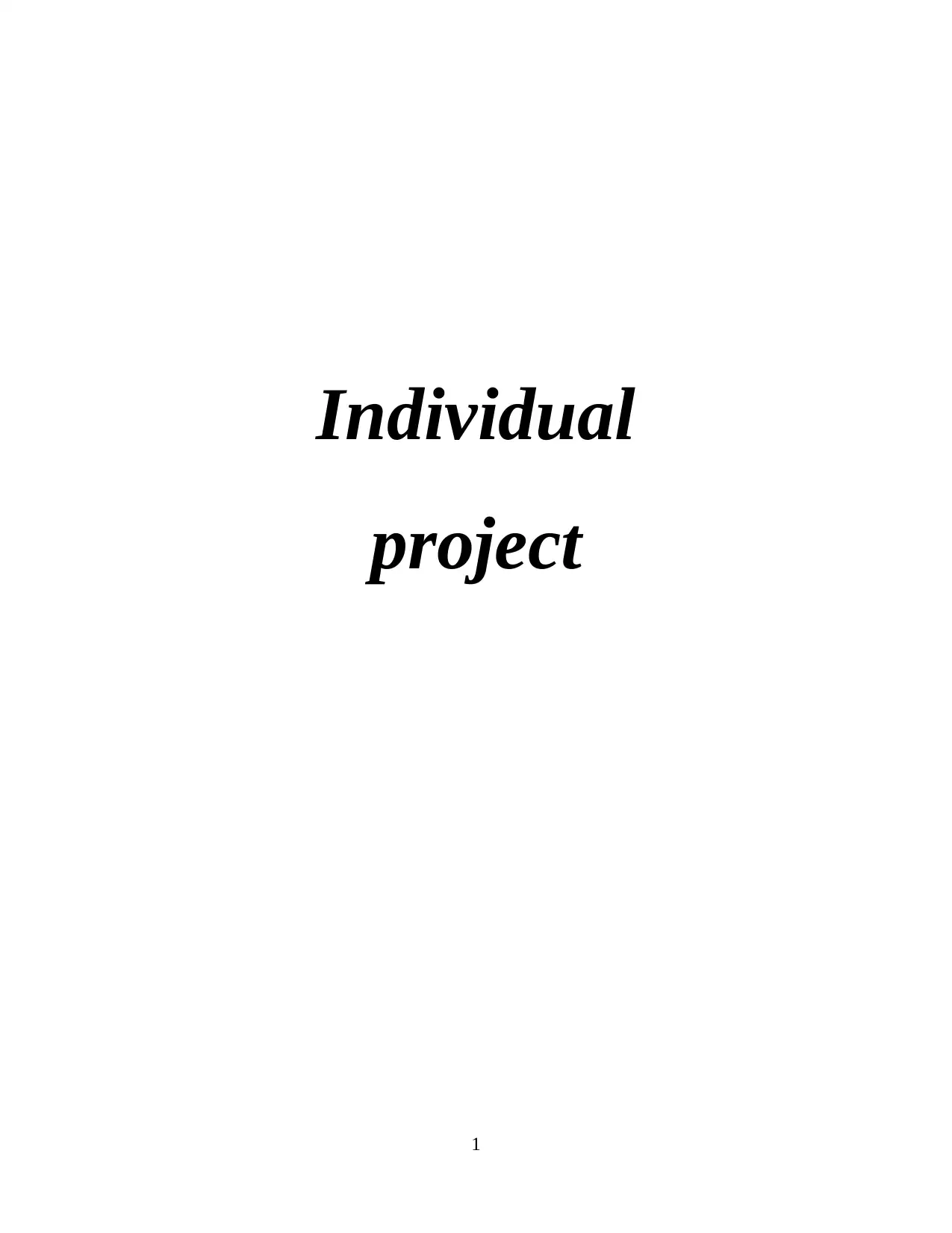
Individual
project
1
project
1
Paraphrase This Document
Need a fresh take? Get an instant paraphrase of this document with our AI Paraphraser
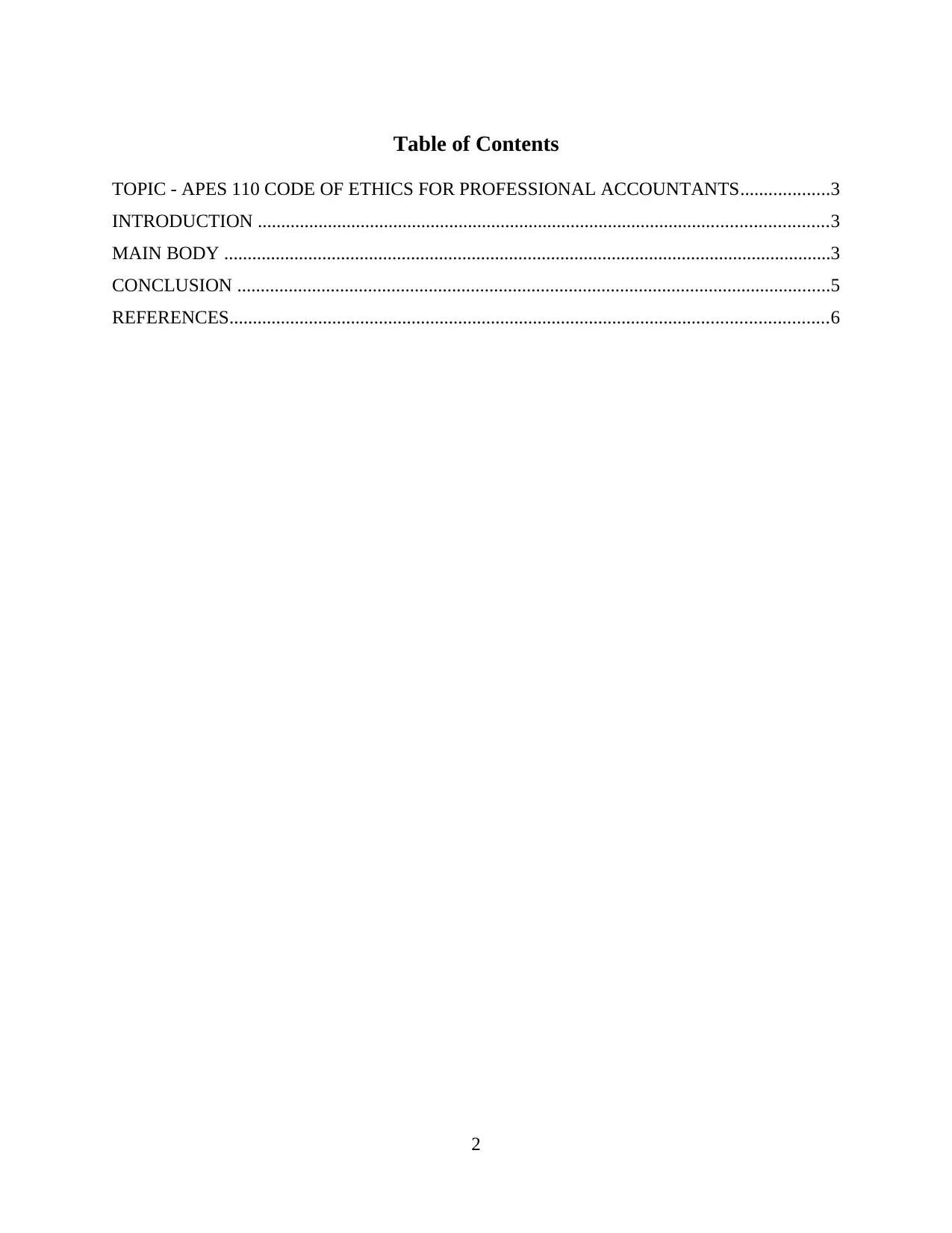
Table of Contents
TOPIC - APES 110 CODE OF ETHICS FOR PROFESSIONAL ACCOUNTANTS...................3
INTRODUCTION ..........................................................................................................................3
MAIN BODY ..................................................................................................................................3
CONCLUSION ...............................................................................................................................5
REFERENCES................................................................................................................................6
2
TOPIC - APES 110 CODE OF ETHICS FOR PROFESSIONAL ACCOUNTANTS...................3
INTRODUCTION ..........................................................................................................................3
MAIN BODY ..................................................................................................................................3
CONCLUSION ...............................................................................................................................5
REFERENCES................................................................................................................................6
2
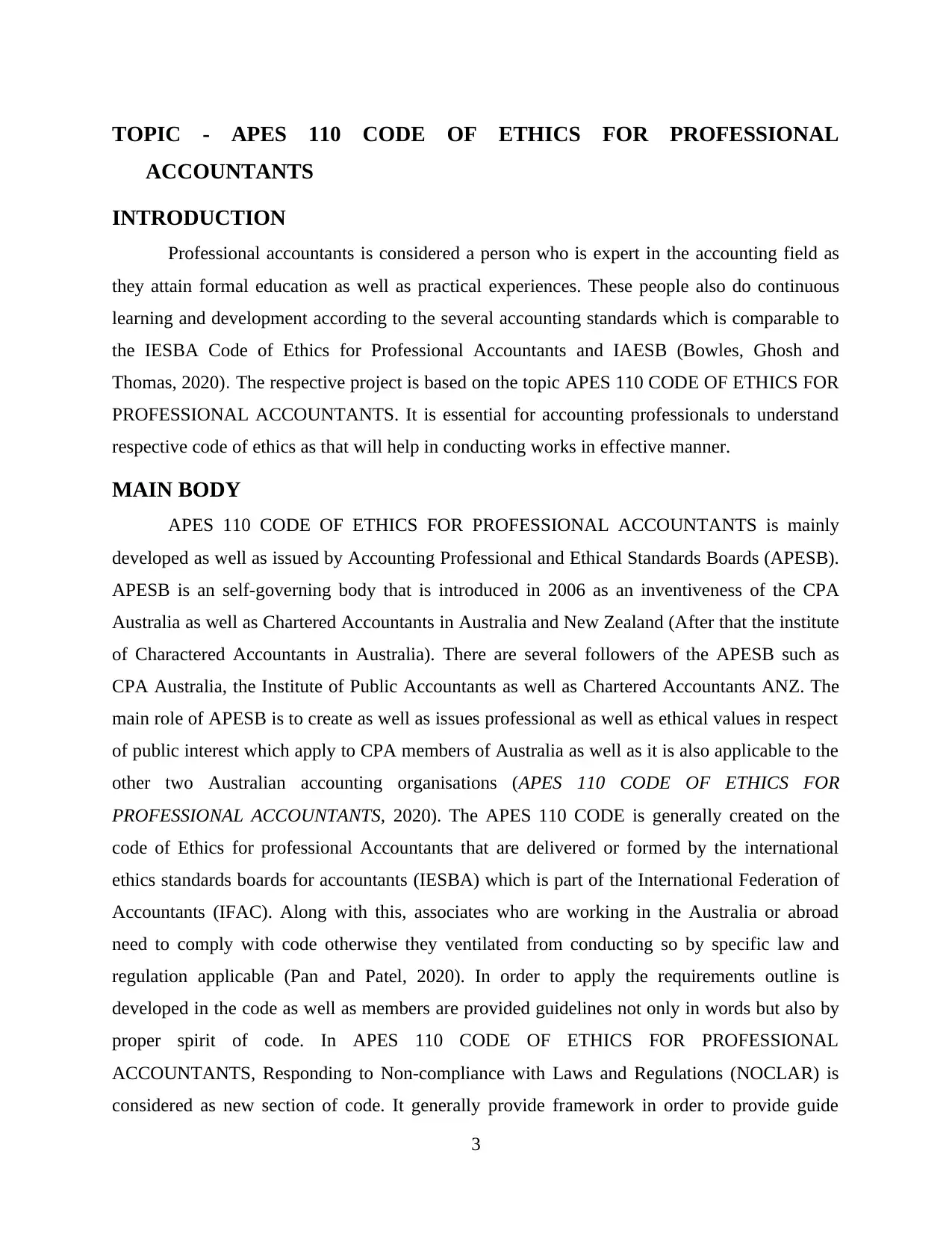
TOPIC - APES 110 CODE OF ETHICS FOR PROFESSIONAL
ACCOUNTANTS
INTRODUCTION
Professional accountants is considered a person who is expert in the accounting field as
they attain formal education as well as practical experiences. These people also do continuous
learning and development according to the several accounting standards which is comparable to
the IESBA Code of Ethics for Professional Accountants and IAESB (Bowles, Ghosh and
Thomas, 2020). The respective project is based on the topic APES 110 CODE OF ETHICS FOR
PROFESSIONAL ACCOUNTANTS. It is essential for accounting professionals to understand
respective code of ethics as that will help in conducting works in effective manner.
MAIN BODY
APES 110 CODE OF ETHICS FOR PROFESSIONAL ACCOUNTANTS is mainly
developed as well as issued by Accounting Professional and Ethical Standards Boards (APESB).
APESB is an self-governing body that is introduced in 2006 as an inventiveness of the CPA
Australia as well as Chartered Accountants in Australia and New Zealand (After that the institute
of Charactered Accountants in Australia). There are several followers of the APESB such as
CPA Australia, the Institute of Public Accountants as well as Chartered Accountants ANZ. The
main role of APESB is to create as well as issues professional as well as ethical values in respect
of public interest which apply to CPA members of Australia as well as it is also applicable to the
other two Australian accounting organisations (APES 110 CODE OF ETHICS FOR
PROFESSIONAL ACCOUNTANTS, 2020). The APES 110 CODE is generally created on the
code of Ethics for professional Accountants that are delivered or formed by the international
ethics standards boards for accountants (IESBA) which is part of the International Federation of
Accountants (IFAC). Along with this, associates who are working in the Australia or abroad
need to comply with code otherwise they ventilated from conducting so by specific law and
regulation applicable (Pan and Patel, 2020). In order to apply the requirements outline is
developed in the code as well as members are provided guidelines not only in words but also by
proper spirit of code. In APES 110 CODE OF ETHICS FOR PROFESSIONAL
ACCOUNTANTS, Responding to Non-compliance with Laws and Regulations (NOCLAR) is
considered as new section of code. It generally provide framework in order to provide guide
3
ACCOUNTANTS
INTRODUCTION
Professional accountants is considered a person who is expert in the accounting field as
they attain formal education as well as practical experiences. These people also do continuous
learning and development according to the several accounting standards which is comparable to
the IESBA Code of Ethics for Professional Accountants and IAESB (Bowles, Ghosh and
Thomas, 2020). The respective project is based on the topic APES 110 CODE OF ETHICS FOR
PROFESSIONAL ACCOUNTANTS. It is essential for accounting professionals to understand
respective code of ethics as that will help in conducting works in effective manner.
MAIN BODY
APES 110 CODE OF ETHICS FOR PROFESSIONAL ACCOUNTANTS is mainly
developed as well as issued by Accounting Professional and Ethical Standards Boards (APESB).
APESB is an self-governing body that is introduced in 2006 as an inventiveness of the CPA
Australia as well as Chartered Accountants in Australia and New Zealand (After that the institute
of Charactered Accountants in Australia). There are several followers of the APESB such as
CPA Australia, the Institute of Public Accountants as well as Chartered Accountants ANZ. The
main role of APESB is to create as well as issues professional as well as ethical values in respect
of public interest which apply to CPA members of Australia as well as it is also applicable to the
other two Australian accounting organisations (APES 110 CODE OF ETHICS FOR
PROFESSIONAL ACCOUNTANTS, 2020). The APES 110 CODE is generally created on the
code of Ethics for professional Accountants that are delivered or formed by the international
ethics standards boards for accountants (IESBA) which is part of the International Federation of
Accountants (IFAC). Along with this, associates who are working in the Australia or abroad
need to comply with code otherwise they ventilated from conducting so by specific law and
regulation applicable (Pan and Patel, 2020). In order to apply the requirements outline is
developed in the code as well as members are provided guidelines not only in words but also by
proper spirit of code. In APES 110 CODE OF ETHICS FOR PROFESSIONAL
ACCOUNTANTS, Responding to Non-compliance with Laws and Regulations (NOCLAR) is
considered as new section of code. It generally provide framework in order to provide guide
3
⊘ This is a preview!⊘
Do you want full access?
Subscribe today to unlock all pages.

Trusted by 1+ million students worldwide
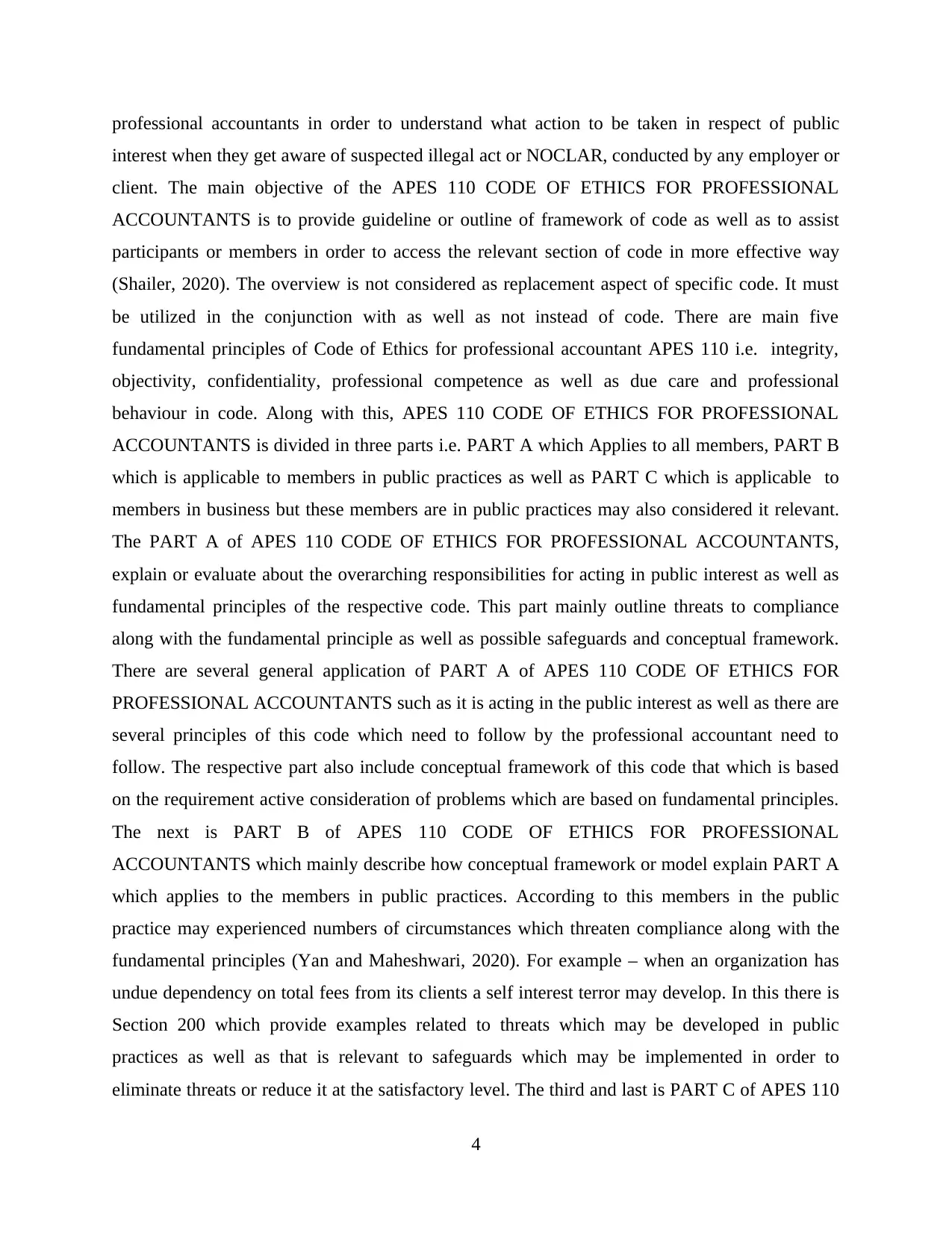
professional accountants in order to understand what action to be taken in respect of public
interest when they get aware of suspected illegal act or NOCLAR, conducted by any employer or
client. The main objective of the APES 110 CODE OF ETHICS FOR PROFESSIONAL
ACCOUNTANTS is to provide guideline or outline of framework of code as well as to assist
participants or members in order to access the relevant section of code in more effective way
(Shailer, 2020). The overview is not considered as replacement aspect of specific code. It must
be utilized in the conjunction with as well as not instead of code. There are main five
fundamental principles of Code of Ethics for professional accountant APES 110 i.e. integrity,
objectivity, confidentiality, professional competence as well as due care and professional
behaviour in code. Along with this, APES 110 CODE OF ETHICS FOR PROFESSIONAL
ACCOUNTANTS is divided in three parts i.e. PART A which Applies to all members, PART B
which is applicable to members in public practices as well as PART C which is applicable to
members in business but these members are in public practices may also considered it relevant.
The PART A of APES 110 CODE OF ETHICS FOR PROFESSIONAL ACCOUNTANTS,
explain or evaluate about the overarching responsibilities for acting in public interest as well as
fundamental principles of the respective code. This part mainly outline threats to compliance
along with the fundamental principle as well as possible safeguards and conceptual framework.
There are several general application of PART A of APES 110 CODE OF ETHICS FOR
PROFESSIONAL ACCOUNTANTS such as it is acting in the public interest as well as there are
several principles of this code which need to follow by the professional accountant need to
follow. The respective part also include conceptual framework of this code that which is based
on the requirement active consideration of problems which are based on fundamental principles.
The next is PART B of APES 110 CODE OF ETHICS FOR PROFESSIONAL
ACCOUNTANTS which mainly describe how conceptual framework or model explain PART A
which applies to the members in public practices. According to this members in the public
practice may experienced numbers of circumstances which threaten compliance along with the
fundamental principles (Yan and Maheshwari, 2020). For example – when an organization has
undue dependency on total fees from its clients a self interest terror may develop. In this there is
Section 200 which provide examples related to threats which may be developed in public
practices as well as that is relevant to safeguards which may be implemented in order to
eliminate threats or reduce it at the satisfactory level. The third and last is PART C of APES 110
4
interest when they get aware of suspected illegal act or NOCLAR, conducted by any employer or
client. The main objective of the APES 110 CODE OF ETHICS FOR PROFESSIONAL
ACCOUNTANTS is to provide guideline or outline of framework of code as well as to assist
participants or members in order to access the relevant section of code in more effective way
(Shailer, 2020). The overview is not considered as replacement aspect of specific code. It must
be utilized in the conjunction with as well as not instead of code. There are main five
fundamental principles of Code of Ethics for professional accountant APES 110 i.e. integrity,
objectivity, confidentiality, professional competence as well as due care and professional
behaviour in code. Along with this, APES 110 CODE OF ETHICS FOR PROFESSIONAL
ACCOUNTANTS is divided in three parts i.e. PART A which Applies to all members, PART B
which is applicable to members in public practices as well as PART C which is applicable to
members in business but these members are in public practices may also considered it relevant.
The PART A of APES 110 CODE OF ETHICS FOR PROFESSIONAL ACCOUNTANTS,
explain or evaluate about the overarching responsibilities for acting in public interest as well as
fundamental principles of the respective code. This part mainly outline threats to compliance
along with the fundamental principle as well as possible safeguards and conceptual framework.
There are several general application of PART A of APES 110 CODE OF ETHICS FOR
PROFESSIONAL ACCOUNTANTS such as it is acting in the public interest as well as there are
several principles of this code which need to follow by the professional accountant need to
follow. The respective part also include conceptual framework of this code that which is based
on the requirement active consideration of problems which are based on fundamental principles.
The next is PART B of APES 110 CODE OF ETHICS FOR PROFESSIONAL
ACCOUNTANTS which mainly describe how conceptual framework or model explain PART A
which applies to the members in public practices. According to this members in the public
practice may experienced numbers of circumstances which threaten compliance along with the
fundamental principles (Yan and Maheshwari, 2020). For example – when an organization has
undue dependency on total fees from its clients a self interest terror may develop. In this there is
Section 200 which provide examples related to threats which may be developed in public
practices as well as that is relevant to safeguards which may be implemented in order to
eliminate threats or reduce it at the satisfactory level. The third and last is PART C of APES 110
4
Paraphrase This Document
Need a fresh take? Get an instant paraphrase of this document with our AI Paraphraser
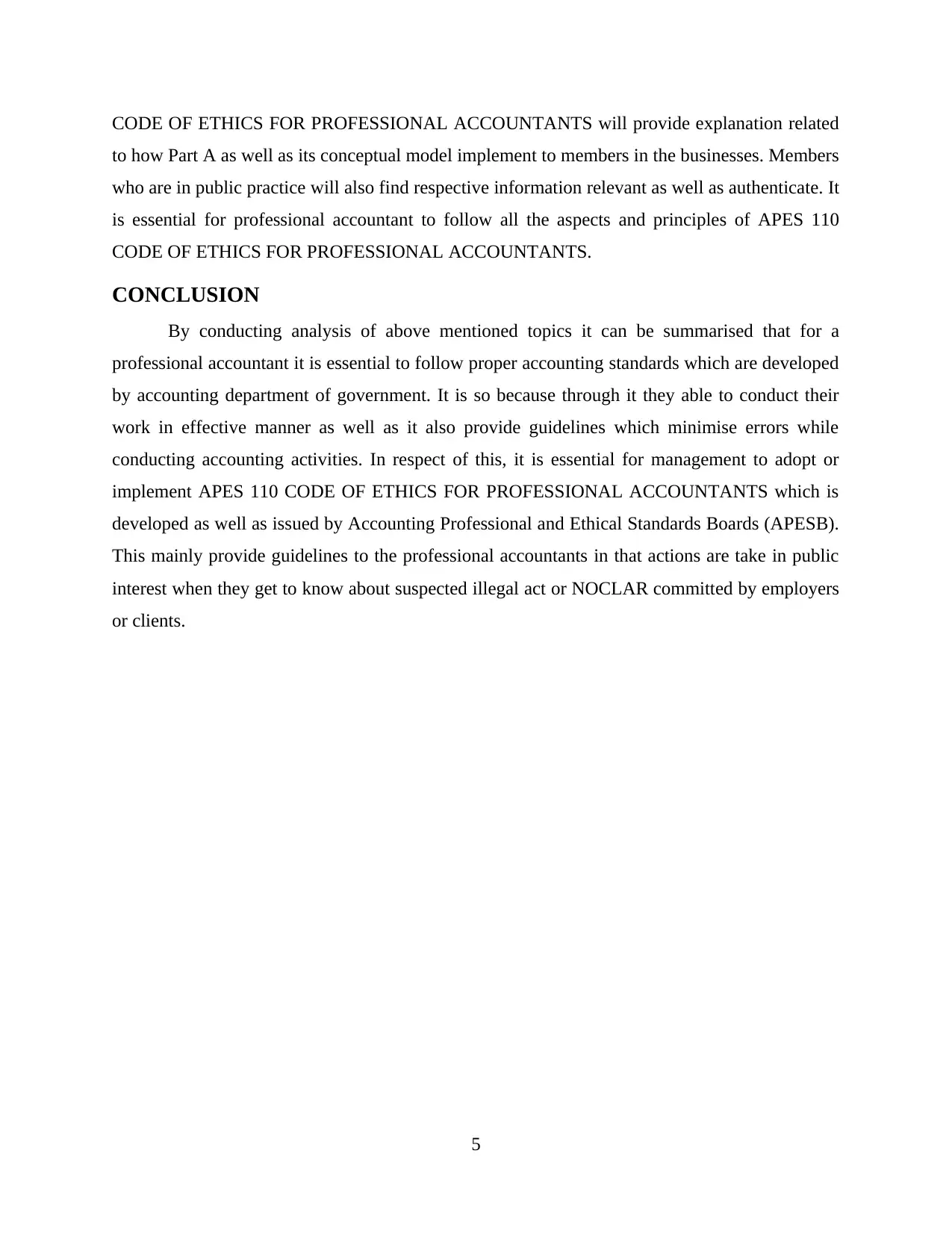
CODE OF ETHICS FOR PROFESSIONAL ACCOUNTANTS will provide explanation related
to how Part A as well as its conceptual model implement to members in the businesses. Members
who are in public practice will also find respective information relevant as well as authenticate. It
is essential for professional accountant to follow all the aspects and principles of APES 110
CODE OF ETHICS FOR PROFESSIONAL ACCOUNTANTS.
CONCLUSION
By conducting analysis of above mentioned topics it can be summarised that for a
professional accountant it is essential to follow proper accounting standards which are developed
by accounting department of government. It is so because through it they able to conduct their
work in effective manner as well as it also provide guidelines which minimise errors while
conducting accounting activities. In respect of this, it is essential for management to adopt or
implement APES 110 CODE OF ETHICS FOR PROFESSIONAL ACCOUNTANTS which is
developed as well as issued by Accounting Professional and Ethical Standards Boards (APESB).
This mainly provide guidelines to the professional accountants in that actions are take in public
interest when they get to know about suspected illegal act or NOCLAR committed by employers
or clients.
5
to how Part A as well as its conceptual model implement to members in the businesses. Members
who are in public practice will also find respective information relevant as well as authenticate. It
is essential for professional accountant to follow all the aspects and principles of APES 110
CODE OF ETHICS FOR PROFESSIONAL ACCOUNTANTS.
CONCLUSION
By conducting analysis of above mentioned topics it can be summarised that for a
professional accountant it is essential to follow proper accounting standards which are developed
by accounting department of government. It is so because through it they able to conduct their
work in effective manner as well as it also provide guidelines which minimise errors while
conducting accounting activities. In respect of this, it is essential for management to adopt or
implement APES 110 CODE OF ETHICS FOR PROFESSIONAL ACCOUNTANTS which is
developed as well as issued by Accounting Professional and Ethical Standards Boards (APESB).
This mainly provide guidelines to the professional accountants in that actions are take in public
interest when they get to know about suspected illegal act or NOCLAR committed by employers
or clients.
5
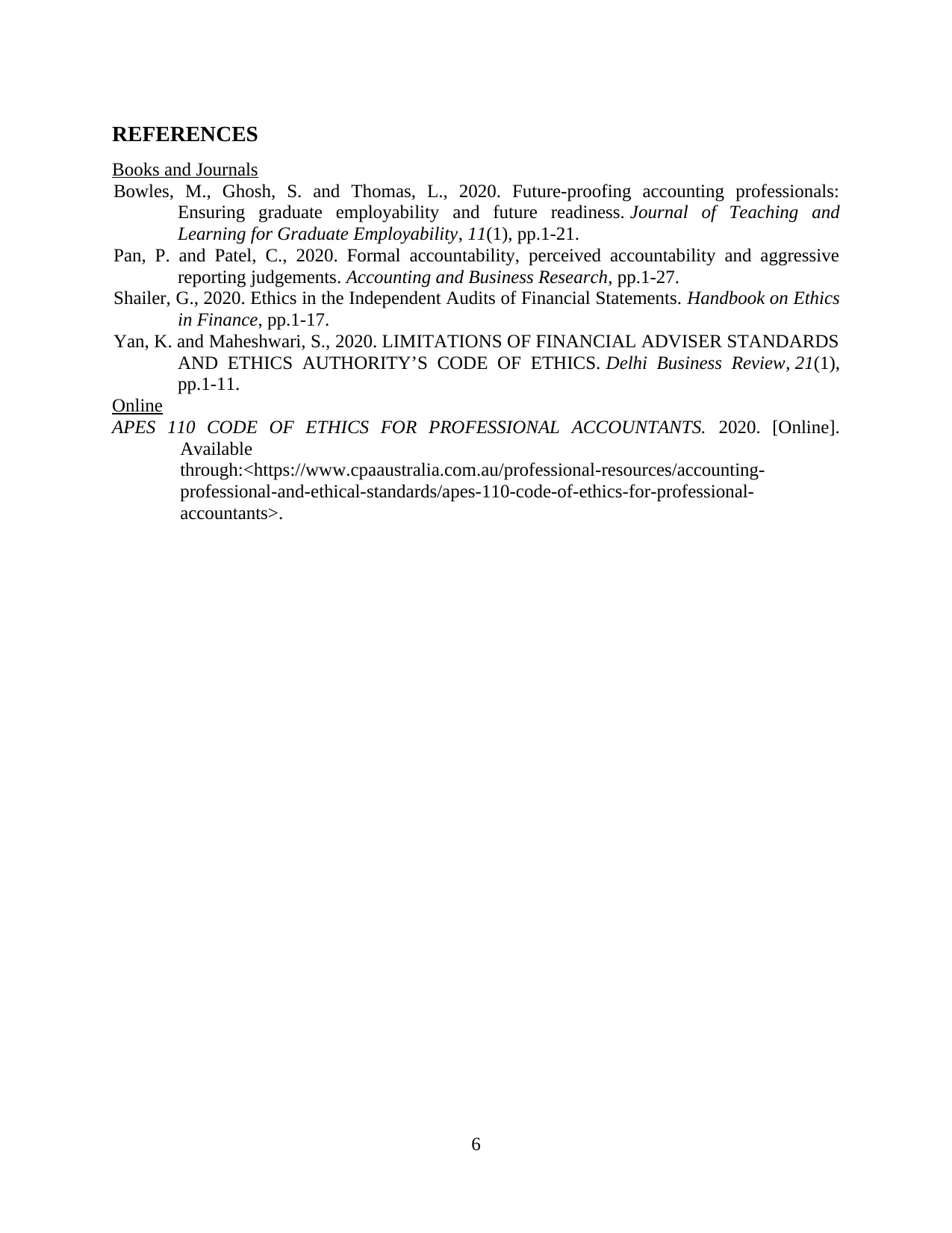
REFERENCES
Books and Journals
Bowles, M., Ghosh, S. and Thomas, L., 2020. Future-proofing accounting professionals:
Ensuring graduate employability and future readiness. Journal of Teaching and
Learning for Graduate Employability, 11(1), pp.1-21.
Pan, P. and Patel, C., 2020. Formal accountability, perceived accountability and aggressive
reporting judgements. Accounting and Business Research, pp.1-27.
Shailer, G., 2020. Ethics in the Independent Audits of Financial Statements. Handbook on Ethics
in Finance, pp.1-17.
Yan, K. and Maheshwari, S., 2020. LIMITATIONS OF FINANCIAL ADVISER STANDARDS
AND ETHICS AUTHORITY’S CODE OF ETHICS. Delhi Business Review, 21(1),
pp.1-11.
Online
APES 110 CODE OF ETHICS FOR PROFESSIONAL ACCOUNTANTS. 2020. [Online].
Available
through:<https://www.cpaaustralia.com.au/professional-resources/accounting-
professional-and-ethical-standards/apes-110-code-of-ethics-for-professional-
accountants>.
6
Books and Journals
Bowles, M., Ghosh, S. and Thomas, L., 2020. Future-proofing accounting professionals:
Ensuring graduate employability and future readiness. Journal of Teaching and
Learning for Graduate Employability, 11(1), pp.1-21.
Pan, P. and Patel, C., 2020. Formal accountability, perceived accountability and aggressive
reporting judgements. Accounting and Business Research, pp.1-27.
Shailer, G., 2020. Ethics in the Independent Audits of Financial Statements. Handbook on Ethics
in Finance, pp.1-17.
Yan, K. and Maheshwari, S., 2020. LIMITATIONS OF FINANCIAL ADVISER STANDARDS
AND ETHICS AUTHORITY’S CODE OF ETHICS. Delhi Business Review, 21(1),
pp.1-11.
Online
APES 110 CODE OF ETHICS FOR PROFESSIONAL ACCOUNTANTS. 2020. [Online].
Available
through:<https://www.cpaaustralia.com.au/professional-resources/accounting-
professional-and-ethical-standards/apes-110-code-of-ethics-for-professional-
accountants>.
6
⊘ This is a preview!⊘
Do you want full access?
Subscribe today to unlock all pages.

Trusted by 1+ million students worldwide
1 out of 6
Related Documents
Your All-in-One AI-Powered Toolkit for Academic Success.
+13062052269
info@desklib.com
Available 24*7 on WhatsApp / Email
![[object Object]](/_next/static/media/star-bottom.7253800d.svg)
Unlock your academic potential
Copyright © 2020–2026 A2Z Services. All Rights Reserved. Developed and managed by ZUCOL.





